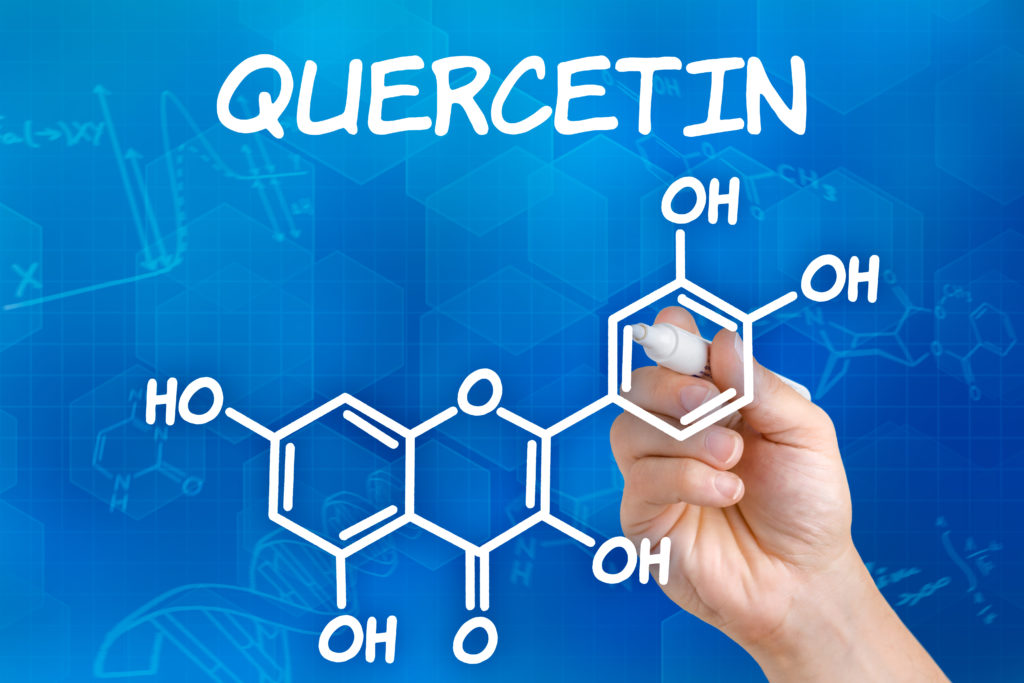
The natural substance Quercetin is attracting a lot of attention these days for its anti-aging and immune-boosting qualities. Quercetin is a plant-based flavonoid polyphenol and a super-antioxidant that is found in a broad spectrum of vegetables and fruits, everything from red onions and green tea to grape skins, apples, and tomatoes.
I became intensely interested in Quercetin because it is one of the many natural substances that is used on the highly effective Greece Test, also called the RGCC test─ and it has become a positive choice for most women on a Breast Cancer healing journey just about 100% of the time!
The fact that Quercetin is a superstar among immuno-protective agents has been proven time and again in many studies, but what makes it so great as a healing force specifically against Breast Cancer?
Quercetin’s Relationship to Cancer
 Quercetin is a strong chemoprotective natural compound for a wide range of cancers because of the multi-targeted way it relates to cancer cells in general. For example, for lung cancer, Quercetin users saw a 51% reduction in risk (and a 65% reduction amongst smokers). For colon cancer, there was a 32% reduction in risk, and for stomach cancer, a 43% reduction.
Quercetin is a strong chemoprotective natural compound for a wide range of cancers because of the multi-targeted way it relates to cancer cells in general. For example, for lung cancer, Quercetin users saw a 51% reduction in risk (and a 65% reduction amongst smokers). For colon cancer, there was a 32% reduction in risk, and for stomach cancer, a 43% reduction.
Quercetin has the ability to stop the process that can turn healthy cells into malignant ones by protecting cellular DNA from mutations that can lead to cancer. It does this by literally “freezing” cancer cells, even if they are producing rapidly, and returning them back to an early stage of their development. This reversal process triggers apoptosis or cancer cell death. As a preventative, Quercetin acts as a watchdog for abnormally-signaling cell pathways that could potentially turn cancerous.
Quercetin is a true “chemo-preventative” substance: it works on multiple fronts so that cancer cells never even have a chance to form a tumor.
Quercetin’s Effect on Breast Cancer
Specifically in regards to Breast Cancer, research has discovered that:
-Significantly affects the cyclooxygenase-2 (COX-2) molecule in breast cancer cells, an important mediator in the inflammatory process;
-Used in a dose-dependent manner inhibits angiogenesis, the process which can lead to new tumor growth, in Breast Cancer cells through a number of cellular pathways;
-Has an effect on the reproductive system’s sex hormone receptors. For breast cancer in particular, Quercetin stimulates “beta” estrogen receptors, which are cancer-suppressing (“Alpha” estrogen receptors, on the other hand, are considered cancer-promoting);
-Works with even more effectiveness against Breast Cancer in conjunction with other substances, including localized near infra-red hyperthermia as well as EGCG found in green and  matcha tea;
matcha tea;
Quercetin is also a “superstar” of chemoprevention because it is one of the rare substances that appears to have an apoptotic effect on the stem cells of certain cancers. Research has confirmed this effect on colorectal and pancreatic cancers directly. Although no studies have directly confirmed its effect on Breast Cancer stem cells thus far, the outlook is positive that one day the connection may be made considering its cytotoxic effect on Breast Cancer cells in general has already proven to be so high.
How to Take Quercetin
Direct injection and oral administration of Quercetin alone or in conjunction with localized hyperthermia for those who are on a Breast Cancer journey is available through qualified holistic and integrative health centers and professionals. For health maintenance and as part of a preventative Healthy Breast protocol, however, quercetin is excellent to take in supplement form by itself or in combination with other complementary substances, such as Resveratrol (many quality supplement companies offer this combination). The Quercetin that has been repeatedly tested by the RGCC labs in Greece can be found in my store.
Dr. Veronique Desaulniers, better known as Dr. V, is the founder of The 7 Essentials System®, a step-by-step guide that teaches you exactly how to prevent and heal Breast Cancer Naturally.